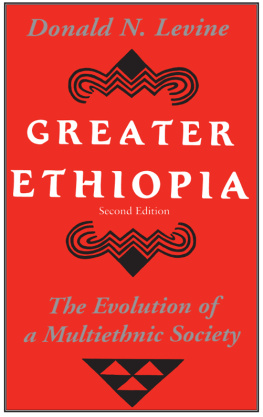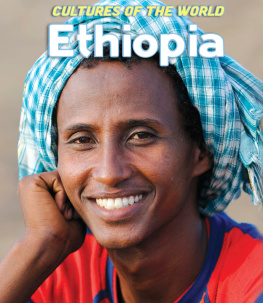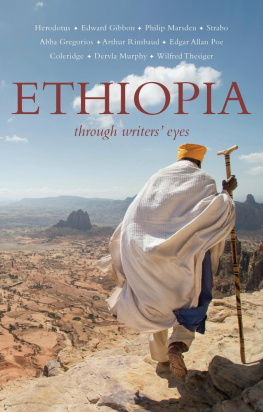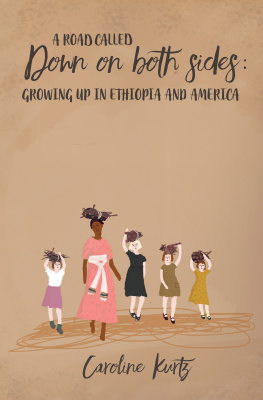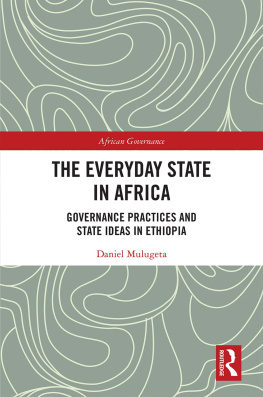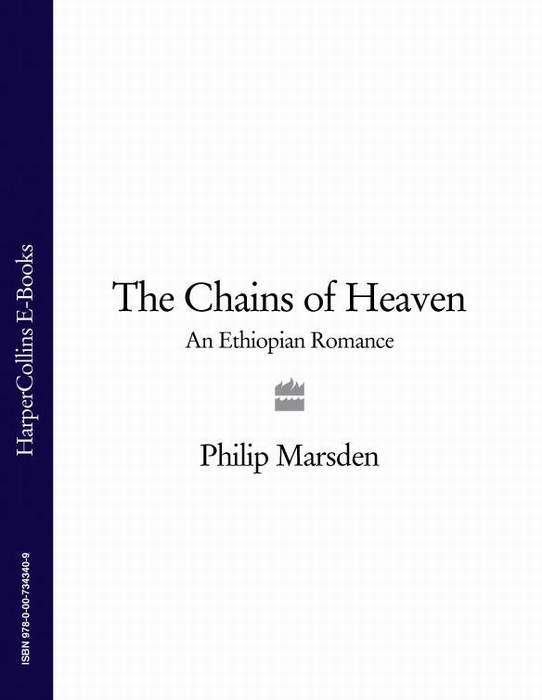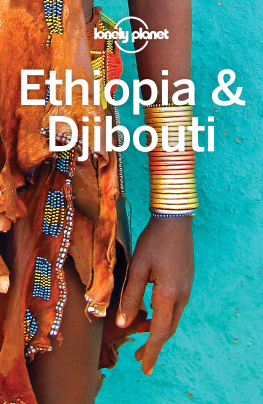
The German original thiopien Zwischen Himmel und Erde (2nd edition 2008), was published by Books on Demand GmbH, Norderstedt (BoD). A French translation by Laurence Seguin, was published in June 2007 under the title Ethiopie Entre ciel et terre by ditions du Sextant, Paris. This English edition was revised and updated in 2011.
Other travel books by Bernd Bierbaum: Paris ein Rendezvous mit der Liebe (in German, BoD, 2009), Patax O Olhar Proximo (about the Patax tribe in Brazil, in Portuguese, BoD, 2009), South Africa (in German and Dutch, National Geographic, 2009).
In Ethiopia follows the historical route across the Ethiopian plateau, including the city of Harar. Ten percent of the proceeds from the sale of this book go toward funding social projects in Ethiopia. For more information on the author visit www.beertree.de
Special acknowledgements:
Kumelachew Alemu, Senait Mekonnen, Dawn Kennedy, Albert Buhr, and Richard Bertelsmann.
Cover design: Mark Bolton; images: Bernd Bierbaum
The cover image shows a path in Lalibela leading to what Ethiopian Christians believe is Adams tomb.
2011 Bernd Bierbaum
Layout, Printing and Publishing:
Books on Demand GmbH, Norderstedt
ISBN: 978-3-8448-7702-1
For Isabel and George
Contents
Why are you so attracted to Ethiopia, of all places? the elderly lady in the seat across from me enquires. Before I can think of a reply, the high-speed train we are travelling in is sucked into a tunnel, blocking my ears with air pressure. For a moment, everything is silent. Its as though were suspended in a hot air balloon, holding our breath. Then we emerge into daylight, tearing past a blurred band of rectangular fields and roofs.
To answer her question, I have to go back to when I was a child and spent hours in front of a large world map on the wall of my fathers study. I mulled over names like Rarotonga or Samarkand, tasting their strange sounds on my tongue and wondering what such places would look like. What struck me about Ethiopian names was that many, like Axum or Gondar, had only two syllables. These names held a particular charm for me: they were exotic, yet dense and concise, like the essence of something precious and strange. But how could I explain to the lady on the train that Ethiopias appeal arose from its seductive-sounding names?
A few hours later, Im aboard a plane from Europe to Addis Ababa. As we reach cruising altitude, I see the Nile from the window, winding its leisurely way through the desert and along the towns of Lower Egypt. The sun sets at Aswan, turning the water to liquid silver and dyeing the evening sky purple and red. By the time we reach Khartoum, the Nile is no more than a pale line in the darkness. Its banks are lit up with homes, flickering like a string of precious pearls. At one point, this string splits in two, and the White Nile disappears towards central Africa, while the Blue Nile snakes towards the Abyssinian plateau. At last I notice the first faint lights of the capital Addis Ababa, the New Flower, dotted on the horizon.
Its almost midnight when I lift my bag off the luggage carousel. In my budget room near the central market, I enjoy a deep, undisturbed sleep until Im woken by the chant of the faithful at dawn. From early morning, Addis Ababa exudes its characteristic perfume, a subtle mixture of diesel fumes, eucalyptus and incense. The believers gather in churches and mosques, while joggers trot along fragrant tree-lined avenues. In the markets, especially the Mercato at the edge of the central business district, life pulsates. Corrugated iron roofs buckle under piles of blue, yellow and green plastic, almost suffocated by stalls offering mesh-wire mats, charcoal, coffins and cow dung. Empty cough-mixture bottles are washed and reusable buckets rinsed of remnants of paint. Several people are busy hammering used wires back into shape, and an old man waits for customers to purchase one of the broken watches he has laid out in front of him. On a corner, a notice board declares: Happiness depends on the possibility to realize!
I spend a lazy afternoon under the tall trees by the Hiltons pool, luxuriating in its hot thermal spring water. Birds of prey circle overhead. In the water, two Ethiopian kids debate dermatology. One reveals her secret skin-lightening cure: the white chocolate her daddy brings home from the duty-free shops. In the lounge, a TV documentary recounts Tchaikovskys depressions before an advert delivers, in epic detail, the virtues of a new brand of soap.
I leave the hotel and stroll the busy streets. From a vantage point close to tin shacks, I overlook a dirty city, huddling in a smog-filled valley. As I take a photo of the scenery, a teenager clad in a bright Arsenal Football Club shirt stops and asks me: Do you find this beautiful? When I reach the steps of the clean and luxurious Sheraton the same place looks like a well-kept garden.
In the late afternoon I arrive at Meskal Square, the huge old parade grounds of the socialist era. Expansive as an airport runway, its twelve lanes are used by diesel-belching minibuses and blue and white Soviet Ladas, which look lost in all this space. Only rarely a Holland car passes by. Produced in China but assembled in Ethiopia, it is the new pride of the country. I get a closer glimpse of it at an open-air Christmas fair near the square. Looking all slick and shiny, I cant inspect its inside though, as all its handles are broken off. Beside it an old woman sells chicken eggs.
I walk on towards Churchill Road, the most linear of the capitals many roads. Making straight for the horizon, over hills and through dips, pedestrians and motorists plot their own intricate course, swerving and weaving to avoid mounds of rubble, and obstinate donkeys. At the National Theatre, an usher waves me in for the grand tour. On stage, a peasant man tries to make sense of three officials, all clad in suits and waving documents in his face. His tragic-comical efforts entice the audience into frenzied applause and outbursts of laughter. Suddenly a few dozen spectators stand up and walk towards the inner wall of the theatre, only to kneel down and prepare for their religious ritual. At the same time, from far away, an imam calls for prayer.
Strolling on, I see a crowd of young adolescents reading magazines and newspapers on the steps of a high-rise. It turns out that they pay a rental to read them for a few minutes before they are passed on to the next customer. Not far from Churchill Street, young artists show their latest works in the exhibition hall of the Alliance Franaise, while in its library, philosophy professors and the ambassador of Greece discuss the Greek miracle the supposed sudden emergence of rational thought in the 5th century BC.
Back in a side street, kitchen odours prevail over exhaust fumes. Billboards advertising American or European-style fare offer a limited choice between Burger Queen, Burger Chicken or Burger Cow. These alternate with displays of injera, Ethiopias national dish, made from the indigenous grass seeds of teff. Depending whether this is a fasting day or not, the injera will be either adorned with meats or overcooked vegetables. I dont feel ready for either option and head straight for the Hongkong, a Chinese eatery. Im the only customer and pick a table next to the aquarium. Nothing moves except a fat goldfish snapping at its own reflection. Two huge clocks in baroque plastic frames hang on the wall. They differ by six hours. Local time versus Chinese time, I wonder? Later I learn the reason for the discrepancy: in Ethiopia the day is measured from 6am in the morning, as was the custom in Biblical times. Therefore, 5am to an Ethiopian is 11pm to anyone else. Also, the Ethiopian year consists of thirteen months instead of twelve, starts in September rather than in January, and dawdles six years and nine months behind the Western timeline. None of these time idiosyncrasies seem to affect the service provided by the Hongkong Restaurant, which follows its very own chronology no-mans time. Eventually the kitchen door opens and the chef, Tony, appears grinning, exposing an incomplete set of crooked teeth. Laughing, he puts his arm round my shoulder and immediately starts telling me about his homeland, which he will never see again, and the neglected Chinese cemetery of Addis Ababa.
Next page

